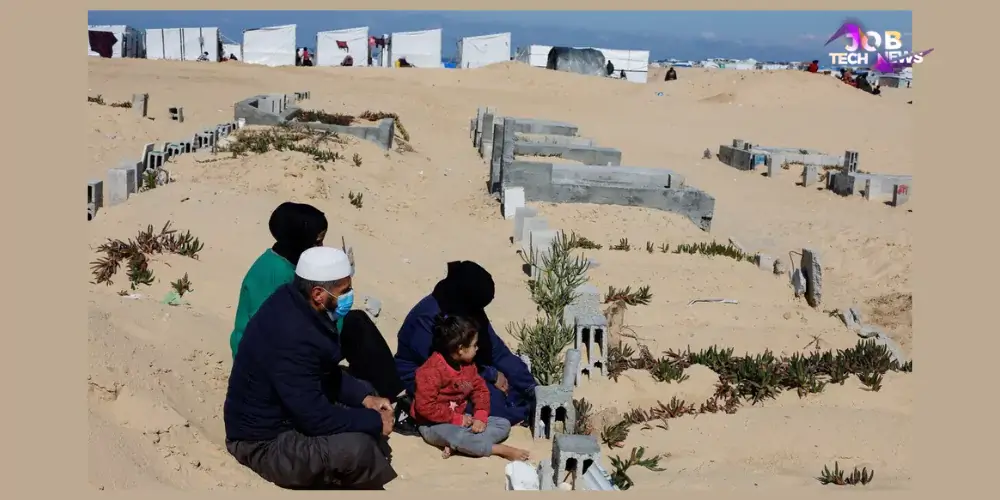The United States for the third time blocked a UN Security Council resolution calling for an immediate ceasefire in Gaza, saying it would jeopardize negotiations on a hostage treaty.Algeria was the only country to vote against the proposed ceasefire. Tuesday’s decision was OURS. With 13 favorable votes, Great Britain was the only country to abstain; Among them were close friends in Washington who said their concern about the Algerian text was secondary to the humanitarian needs of the Palestinians.
At a time when more than 2 million people are starving and some 30,000 Palestinians have lost their lives. , Washington still has a veto for another use.Algeria’s UN representative Amar Bendjama told the council that supporting this draft resolution would mean the Palestinian people’s right to life. “On the other hand, voting against it suggests that the horrific violence and mass punishments inflicted on them are acceptable.”Algeria’s resolution also called for interim measures from the International Court of Justice (ICJ) in The Hague. implement the order in January. Israel has been ordered to reduce the intensity of attacks to protect civilians, remove obstacles to help reach Gaza and take action against Israeli politicians who use genocidal language.
“There is still no hope for an improvement in the situation in Gaza almost a month later. the ICJ [decision].” , Bendjama said. “Silence is not a practical solution. The time for action and the pursuit of truth is now.”The continued passive avoidance of an immediate ceasefire is no different from giving the green light to the continued slaughter,” stated Chinese ambassador Zhang Jun.
An alternate resolution that the US has crafted asks Israel to halt its planned onslaught on Rafah, the southernmost city in Gaza where over a million Palestinians have taken refuge, and calls for a temporary truce “as soon as practicable.”But the US resolution is unlikely to be put to a vote for a few days at the very least, and the timing of its third veto of a ceasefire is embarrassing for Washington, which is trying to rally the world against Russia on the eve of the country’s second full-scale invasion of Ukraine. The US envoy, Linda Thomas-Greenfield, provided an explanation for the veto, stating that Joe Biden was negotiating with Israel, Egypt, and Qatar in order to reach a complete agreement with the hostages.
Thomas-Greenfield stated, “We believe that the resolution on the table right now would in fact negatively impact those negotiations, and any action this council takes right now should help, not hinder these sensitive and ongoing negotiations.””It will not result in lasting peace to demand a quick, unconditional ceasefire without an accord requiring Hamas to free the hostages. Rather, it might prolong the conflict between Israel and Hamas,” she continued, going on to criticize the Algerian resolution’s 13-1 vote as “wishful and reckless.”Thomas-Greenfield watched stonily as a string of Washington allies, including France, Slovenia, and Switzerland, gave their justifications for supporting the resolution. They shared the US’s concern that it omitted any condemnation of Hamas, something that the security council has not been able to accomplish thus far.
They all maintained that halting the war was more important than other considerations because of the terrible humanitarian crisis in Gaza.The French ambassador, Nicolas de Rivière, expressed sorrow on behalf of Paris that “the resolution was not adopted given the disastrous situation on the ground.”The British abstention was the single vote that kept the US from being completely isolated. The UK is calling for a “immediate suspension in fighting to get aid in and hostages out leading to a permanent sustainable ceasefire,” according to the ambassador, Barbara Woodward.
However, Woodward reiterated Thomas-Greenfield’s points by saying, “This resolution does not only ask for a ceasefire; it will not bring it about. Yes, it could jeopardize hostage negotiations. That could actually make a ceasefire unlikely.Ahead of Tuesday’s vote, the US presented an alternative draft to other council members. According to one Western official, this unprecedented move was aimed at avoiding the impression that the US veto meant approval of an Israeli attack on Rafah.
The UN interprets the inclusion of the US text in the clause as a call to Israel not to launch such. attack attack attack attack – rather than being limited to bilateral channels – as a sign of Biden’s growing frustration with Benjamin Netanyahu’s administration and his failure to prevent the US president from halting the Gaza offensive, now in its fifth month. However, there is still no official start date for formal discussions on the US draft resolution.
The head of the UN’s International Crisis Group, Richard Gowan, said: “This is incredibly embarrassing for the American people.” Days before a Security Council meeting to honor Russia’s full-scale invasion of Ukraine, they were forced to veto it. This only fuels the debate about unfair American standards.


